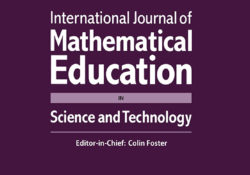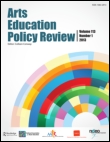tandfonline.com har udgivet en rapport under søgningen „Teacher Education Mathematics‟: ABSTRACT ABSTRACT As a result of international neoliberal and neoconservative trends, the status of the arts has been devalued in secondary school curricula. This paper examines why the arts are not considered core educational knowledge in pedagogic discourse arising from the New Right policy agenda. In a case study analysis of Swedish educational policy debates, curriculum codes and their underlying principles of recontextualization are weighed as they bear on the arts. Discursive positionings and socio-political networking between political standpoints and stakeholders have been analysed based on official Swedish documents associated with the legislative process of curriculum revision. Our findings show how justifications of arts education clash with coding orientations arising from a strong classification between what is presumed to be… Continue Reading →
Like this:
Like Loading...
tandfonline.com har udgivet en rapport under søgningen „Teacher Education Mathematics‟: Abstract The purpose of this study was to examine the current state of integrated science, technology, engineering, arts, and mathematics (STEAM) education. We conducted an extensive review of the literature, followed by document analysis to construct concepts and themes associated with prospects, priorities, processes, and problems of STEAM education. The analysis of STEAM learning concepts from the literature provided three sub-constructs under the prospects – STEAM movement, the purpose of STEAM education, and benefits of STEAM education. The sub-constructs under priorities of STEAM education were – curriculum integration in STEAM and STEAM education as a curriculum reform. The sub-constructs of STEAM education as a process were – the pedagogical process and assessment in STEAM education. The sub-constructs of the problems in… Continue Reading →
Like this:
Like Loading...
eric.ed.gov har udgivet: An attempt to meet the need for resource materials available for Adult Basic Education (ABE) personnel who work with Spanish-speaking adults is presented. The information presented was acquired by writing to commercial publishers throughout the country. Evaluations included were completed by identifying the usefulness of the curricular offerings for Spanish-speaking adults. Portions of the evaluations are designed for children and junior and senior high school students; some of these have proven useful to adults. Evaluative criteria used when the materials were assessed include: Title, Author, Publisher, Objectives, Criterion Measures, Instructional Components, Learner Prerequisite, Teacher Requirements, Reliability Effect, Cost and Time. (Author/CK) Link til kilde
Like this:
Like Loading...

tandfonline.com har udgivet en rapport under søgningen „Teacher Education Mathematics‟: ABSTRACT ABSTRACT Instructional quality is a research topic that has received increased attention over the past decades. However, despite evidence for its importance to student learning, few studies are designed to examine patterns of prevalent instruction. The present study aimed to enhance the understanding of instructional quality in Swedish lower secondary school by examining patterns of instruction in 7th grade language arts and mathematics. 274 lessons from 73 separate classrooms were video-recorded and analyzed using the Protocol for Language Arts Teaching Observation (PLATO). Findings of the study show that lessons were largely organized through either whole-class instruction or individual seatwork. Mathematics included significantly more explicit teacher scaffolding and mathematics teachers scored higher than language arts teachers on nearly all instructional… Continue Reading →
Like this:
Like Loading...
eric.ed.gov har udgivet: This Issue Brief is based on telephone interviews of 21 state policymakers to discuss the salient education issues in their states and their views on arts education. Six state senators, eight state representatives, one state board of education member, two deputy commissioners of education, three current state superintendents and one former state superintendent were interviewed between November 21, 2005 and February 27, 2006. All of the legislators serve on their respective education committees, and most chair these committees. Political affiliation among these policymakers was approximately equal, with nine Republicans, 10 Democrats and two unidentified. When asked to describe the most salient education issues in their states, quite a few policymakers mention issues that arts can help address, such as dropout prevention and the achievement gap between poor… Continue Reading →
Like this:
Like Loading...
eric.ed.gov har udgivet: This curriculum activities guide presents a series of instructional plans for practicing teachers who desire to infuse career education into curricular areas, grades 7 through 12. Introductory materials discuss the guide’s purpose and instructional thrust of Project MECCA (Migrant Education Counseling and Career Awareness). They also provide teacher’s materials such as hints for use of activities, suggestions for field trips, information on and forms for shadowing, and information on group processing tools, such as brainstorming, fishbowl technique, stop action, and role playing. The activity plans are organized by grade levels into language arts, social studies, and mathematics or science. Within these sections are placed activities at differing career or occupational knowledge levels. These activities are to be considered as examples, and teachers are encouraged to use them… Continue Reading →
Like this:
Like Loading...
eric.ed.gov har udgivet: This curriculum activities guide presents a series of instructional plans for practicing teachers who desire to infuse career education into curricular areas, grades K through 6. Introductory materials discuss the guide’s purpose and the instructional thrust of Project MECCA (Migrant Education Counseling and Career Awareness). They also provide teacher’s materials such as hints for use of activities, suggestions for field trips, information on and forms for shadowing, and information on group processing tools, such as brainstorming, fishbowl technique, stop action, and role playing. The activity plans are organized by grade levels into language arts, social studies, and mathematics or science. Within these sections are placed activities at differing career or occupational knowledge levels. These activities are to be considered as examples, and teachers are encouraged to use… Continue Reading →
Like this:
Like Loading...
eric.ed.gov har udgivet: Scores for five subjects (Reading, Language Arts, Mathematics, Science, and Social Studies in grades 2 through 8) from the Tennessee Comprehensive Assessment Program were analyzed for several hundred Tennessee grade schools. Schools which owned the Accelerated Reader learning information system (a computer program which allows teachers to monitor and manage student literature-based reading) were compared with schools that had not purchased AR. Schools that owned AR outperformed others in all grades and subjects. (Contains five figures and five tables of data; an appendix contains a brief introduction to the Accelerated Reader.) (Author/RS) Link til kilde
Like this:
Like Loading...
tandfonline.com har udgivet en rapport under søgningen „Teacher Education Mathematics‟: Abstract Formulae display:?Mathematical formulae have been encoded as MathML and are displayed in this HTML version using MathJax in order to improve their display. Uncheck the box to turn MathJax off. This feature requires Javascript. Click on a formula to zoom. Abstract It has been asserted that the test-based accountability of No Child Left Behind (NCLB) increased instruction in tested subject areas reading and math, leading to reductions in arts education. We tested this using two waves of data, before and after NCLB implementation, in a difference-in-differences design. The analyses indicated that the total teacher workforce increased substantially during this time period, while the percentage of reading and math educators remained constant, leading to an overall increase in the teacher… Continue Reading →
Like this:
Like Loading...
eric.ed.gov har udgivet: Writing activities can be used to cultivate students‛ enthusiasm for learning. This book shows teachers how to introduce their students to the benefits of writing in a variety of subjects including math, language arts, science, social studies, and art. Each chapter in the book includes an observation that allows readers to enter a classroom and see how the teacher uses specific writing assignments to sustain and deepen students‛ interaction with subject matter. Each chapter also includes examples of student writing that resulted from each activity; detailed discussion showing how the writing exercises benefited students and teachers; writing prompts; and strategies to evaluate and comment on student writing. Chapters in the book are: (1) Getting Started: Journals and Learning Logs; (2) Putting Ideas in Order: Narratives and Problem… Continue Reading →
Like this:
Like Loading...



